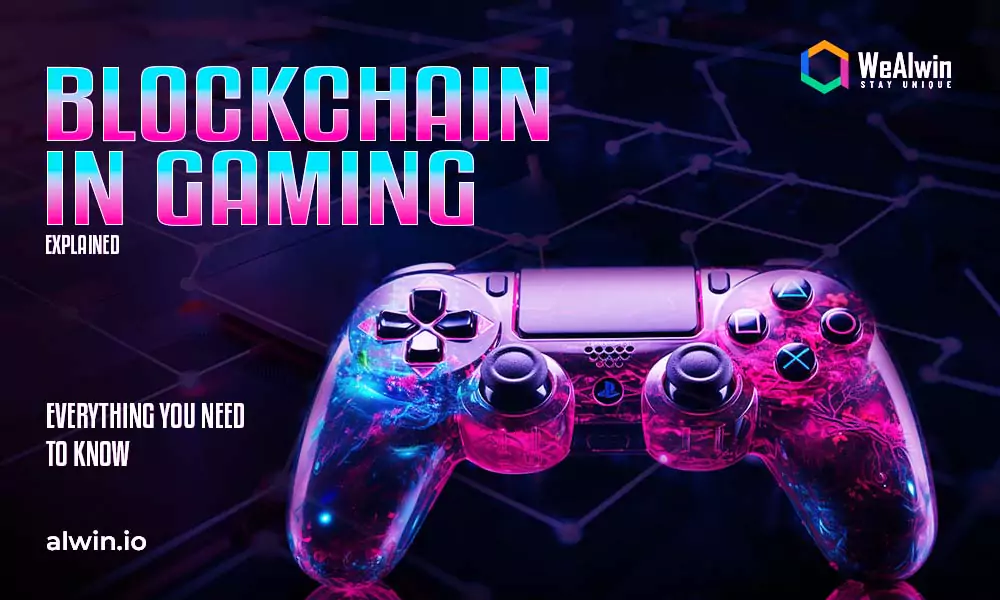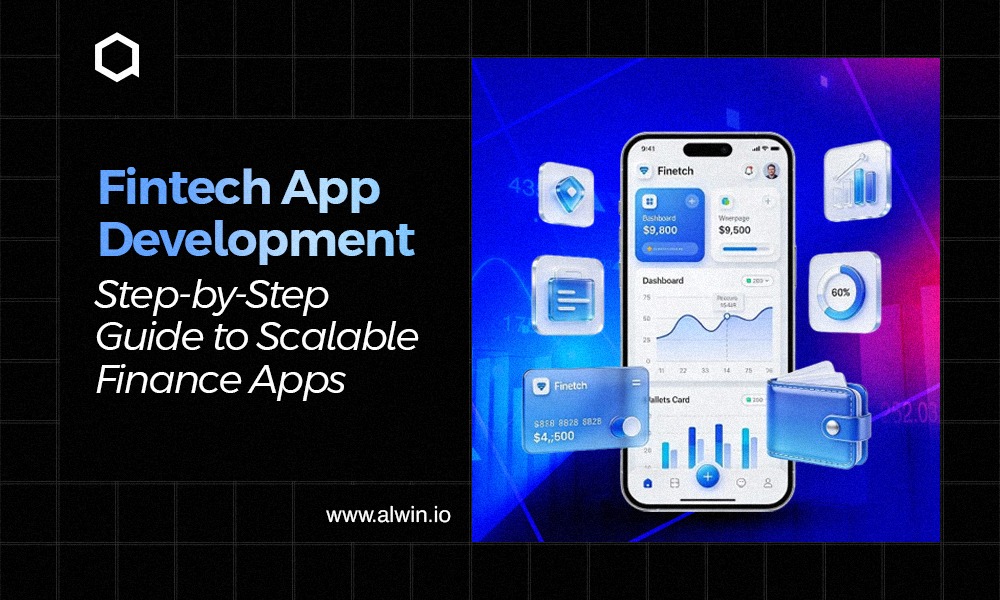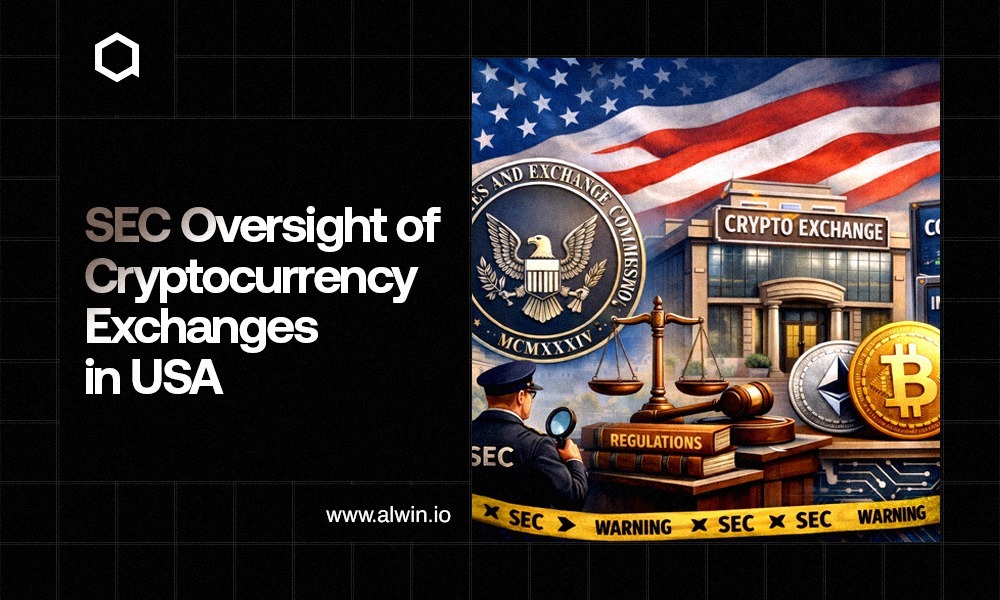Imagine a world where you can sell the rare items you earn in a game for real money or use them in other games. Even better, you, as a player, get to influence how the game develops. This isn’t some far-off idea—blockchain technology is making it happen today.
Blockchain is changing the way many industries work, and gaming is one of them. It brings new possibilities like better security, more transparency, and real ownership of in-game items.
Gamers and game developers should pay attention because blockchain has the power to completely reshape the experience of the gameplay.
Key Statistics
The blockchain gaming market is rapidly expanding. In 2021, the market was valued at approximately $4.6 billion and is projected to grow at a compound annual growth rate (CAGR) of 20.4% from 2022 to 2028, potentially reaching $65 billion by 2027.

This growth is driven by increasing player engagement, the rise of NFTs, and the adoption of blockchain technology in game development, signaling a promising future for blockchain in gaming.
What is Blockchain Gaming?
Blockchain gaming refers to video games that use blockchain technology to store in-game assets, transactions, and game rules on a decentralized network. This allows players to own, trade, or sell in-game items, such as characters, weapons, or land, as non-fungible tokens (NFTs), giving them full control and real-world value.

Comparison with Traditional Gaming Models:
Traditional Gaming: In conventional games, players do not truly own their in-game assets. Items and currencies are stored on central servers, controlled by the game developers, and can be lost if the game is shut down.
Blockchain Gaming: In contrast, blockchain gaming ensures true ownership of digital assets, which are stored on decentralized networks. Players can trade or sell items freely, often even outside the game, and have greater transparency in transactions.
The Evolution of Gaming: From Traditional to Blockchain
Gaming has come a long way over the years. It started with simple arcade games and home consoles and has seen remarkable changes over the decades.
1970s-1980s: The Early Days
- Rise of arcade games and early home consoles like Atari 2600 (1977).
- Single-player experiences dominate the market.
1990s: The Console Revolution
- Introduction of gaming consoles like Sega Genesis (1989) and Sony PlayStation (1994).
- Shift to more advanced graphics, immersive gameplay, and multiplayer experiences.
2000s: The Age of Online Gaming
- The launch of Xbox Live (2002) and World of Warcraft (2004) revolutionized multiplayer gaming.
- Gamers can now connect and compete across the globe.
2010s: Mobile Gaming and Digital Assets
- Rise of mobile gaming with the release of the iPhone and popular mobile games like Angry Birds (2009) and Clash of Clans (2012).
- Introduction of in-game purchases, microtransactions, and digital assets (skins, weapons, etc.).
2020s: The Emergence of Blockchain in Gaming
- Blockchain technology enters gaming, offering true ownership of in-game items through NFTs.
- Popular blockchain games like Axie Infinity (2021) show the potential of Play-to-Earn (P2E) models, where players can earn real value from gaming.
How Blockchain is Reshaping the Gaming Industry?
Blockchain technology is fundamentally transforming the gaming industry, introducing innovative concepts that enhance player engagement, ownership, and monetization.
This shift is driven by several key factors that highlight the advantages of blockchain over traditional gaming models.
- Enhanced Ownership and Control
- New Economic Models
- Transparency and Security
- Community Engagement and Governance
- User-Generated Content and IP Rights
- Future Prospects
Key Features of Blockchain in Gaming
Blockchain technology brings several exciting features to gaming, enhancing player experiences and reshaping the industry.
True Ownership of Digital Assets
NFTs (Non-Fungible Tokens): NFTs are unique digital tokens that represent ownership of specific in-game items, such as characters, skins, or weapons. Unlike regular game assets, each NFT is one-of-a-kind and cannot be duplicated.
Real Ownership: With blockchain, players truly own their in-game items. They can trade, sell, or use these assets outside the game, giving them real value. This contrasts with traditional gaming, where items are often tied to accounts and cannot be transferred.
Interoperability of Gaming Assets
Cross-Game Use: Blockchain allows players to use their digital assets across different games or platforms.
For example, a character's skin or weapon from one game can be used in another, increasing the value and utility of items.
Unified Experience: This interoperability creates a more unified gaming experience, as players can take their favorite items with them wherever they go, regardless of the game they are playing.
Transparency and Security
Immutable Records: Blockchain provides a transparent ledger of all transactions. Once an item is bought, sold, or traded, that history is permanently recorded and cannot be altered. This ensures that players can verify the legitimacy and ownership of assets.
Reduced Cheating and Hacking Risks: With decentralized networks, it becomes much harder for cheaters to manipulate the system. Each transaction is validated by multiple participants, which increases security and reduces the risk of hacking.
Play-to-Earn (P2E) Model
Blockchain enables players to earn real money through gameplay. In P2E games, players can earn tokens or cryptocurrencies by completing tasks, winning battles, or trading items.
The play-to-earn (P2E) model is a revolutionary concept in the gaming industry that allows players to earn real-world value through their gameplay.
Unlike traditional gaming models where players invest time and money without any financial return, P2E games offer tangible benefits for their efforts in the form of cryptocurrencies or non-fungible tokens (NFTs).
Decentralized Governance
Empowering Communities: Blockchain technology allows gaming communities to participate in decision-making through decentralized governance. This means players can have a say in game development, rules, and updates.
Use of DAOs (Decentralized Autonomous Organizations): DAOs enable players to collectively manage and make decisions about the game. Members can propose changes, vote on new features, and manage the game’s economy, leading to a more engaged and invested player base.
Popular Blockchain-Based Games Case Studies
CryptoKitties: Launched in 2017, CryptoKitties allows players to collect, breed, and trade virtual cats on the Ethereum blockchain. Each cat is an NFT, making them unique and tradeable. The game became so popular that it clogged the Ethereum network, showcasing the demand for blockchain gaming.
Decentraland: This virtual world allows users to create, explore, and trade virtual land and assets. Built on the Ethereum blockchain, Decentraland uses NFTs to represent ownership of virtual real estate. Players can build anything from games to art galleries, earning real value through their creations.
Axie Infinity: A pioneer in the Play-to-Earn model, Axie Infinity lets players collect, breed, and battle creatures called Axies. Players can earn tokens through gameplay, which can be traded for real money. This game has attracted millions of players worldwide and generated significant revenue, highlighting the potential of blockchain in gaming.
The Growing Interest in Virtual Worlds (Metaverse)
The concept of the metaverse—a collective virtual shared space—has gained traction, with blockchain playing a crucial role in creating these virtual economies.
In these environments, players can own and trade digital assets, attend events, and interact in ways that mirror real life.
Blockchain technology provides the infrastructure for secure ownership and transactions, enabling users to participate in vibrant virtual economies where their assets hold real value.
Partnerships Between Blockchain Gaming Companies and Traditional Studios
Many traditional gaming studios are exploring partnerships with blockchain development companies to integrate these technologies into their games. This collaboration allows them to tap into the growing interest in digital assets and new business models.
Examples include major companies like Ubisoft and Square Enix, which have shown interest in blockchain gaming, indicating a shift towards embracing this innovative technology.
Challenges of Integrating Blockchain in Gaming
While blockchain technology offers exciting opportunities for the gaming industry, it also faces several challenges that need to be addressed for successful integration. Here are the key challenges:
Scalability Issues
Current Limitations: Many blockchain networks struggle with scalability, meaning they can become slow or congested when too many transactions occur simultaneously.
For example, during the popularity surge of games like CryptoKitties, the Ethereum network faced significant delays.
Impact on Gaming Performance: These scalability issues can lead to lagging gameplay and frustrating experiences for players, making it difficult for blockchain games to compete with traditional, faster gaming platforms.
High Transaction Fees
Gas Fees: Blockchain transactions often incur gas fees, which can fluctuate widely based on network demand. These fees can become prohibitively expensive, especially for frequent microtransactions typical in gaming.
Cost of Transactions: High transaction costs may deter players from engaging in activities like trading or purchasing in-game assets, limiting the economic potential of blockchain games.
User Adoption
Learning Curve: Traditional gamers may find it challenging to understand blockchain concepts, such as wallets, cryptocurrencies, and NFTs. This learning curve can create barriers to entry for players unfamiliar with this technology.
Bridging the Gap: Game developers must find ways to simplify blockchain integration and educate players about its benefits. Creating user-friendly interfaces and providing resources can help bridge the gap between traditional gaming and blockchain gaming.
Regulatory Concerns
Legal Aspects: The legal landscape surrounding blockchain gaming is still evolving. Issues related to the use of NFTs and cryptocurrencies raise questions about ownership rights, taxation, and consumer protection.
Compliance Challenges: Developers must navigate various regulations and ensure compliance with local laws, which can vary significantly across regions. This adds complexity and uncertainty to blockchain gaming projects.
Popular Blockchain Gaming Platforms
Several blockchain platforms provide the foundation for developing and running blockchain-based games.
Each platform offers different advantages in terms of speed, scalability, and cost, making it important for game developers to choose the right one.
Ethereum
The most widely used blockchain platform for decentralized applications (dApps) and games, Ethereum has pioneered the integration of blockchain in gaming, especially with NFTs.
✅ Pros: Large developer community, robust security, and a well-established ecosystem.
❌ Cons: Scalability issues and high gas fees, can hinder gaming experiences, especially during network congestion.
Binance Smart Chain (BSC)
A high-performance blockchain known for its lower transaction fees and faster processing times compared to Ethereum.
✅ Pros: Lower gas fees, faster transaction speeds, and a growing ecosystem of games and dApps.
❌ Cons: More centralized compared to Ethereum, which may be a concern for developers prioritizing decentralization.
Solana
Known for its speed and scalability, Solana offers high throughput at low costs, making it an attractive option for game developers.
✅ Pros: Extremely fast transaction speeds (up to 65,000 transactions per second) and low fees.
❌ Cons: Still a relatively new platform, so it has a smaller ecosystem compared to Ethereum and BSC.
Platform Comparison: Speed, Scalability, and Cost
| Feature |
Solana |
Binance Smart Chain (BSC) |
Ethereum |
| Speed |
Fastest transaction speeds, ideal for games with quick interactions. |
Faster than Ethereum but slower than Solana. |
Slower due to network congestion, but widely used. |
| Scalability |
Handles thousands of transactions per second, highly scalable. |
Better scalability than Ethereum, but is less decentralized. |
Struggles with scalability, aiming to improve with Ethereum 2.0. |
| Cost |
Lowest transaction fees, cost-effective for developers and players. |
Relatively low fees, but higher than Solana. |
Most expensive, especially during high demand, but Layer 2 solutions help reduce costs. |
Introduction to Layer 2 Solutions
What Are Layer 2 Solutions?: Layer 2 solutions are built on top of existing blockchains (Layer 1) to improve their scalability and efficiency. They handle off-chain transactions, reducing the load on the main blockchain while maintaining security.
Role in Enhancing Blockchain Gaming:
Layer 2 solutions, such as Polygon and Arbitrum, help address Ethereum's scalability and cost issues by allowing more transactions to be processed at lower fees.
These solutions enable smoother, faster, and more affordable gameplay experiences, making Ethereum-based games more competitive with platforms like Solana and BSC.
The Future of Blockchain in Gaming
Blockchain technology is set to reshape the gaming industry in profound ways, introducing new models of ownership, economies, and interactive experiences.
Here’s a look at what the future holds:
Ownership & Control: Players will have true ownership of in-game assets using NFTs, influencing traditional games to adopt similar models.
New Business Models: The rise of Play-to-Earn (P2E) games could challenge current pay-to-play and free-to-play systems, offering players income opportunities through gaming.
Metaverse & Virtual Economies
- Blockchain will power the metaverse, where players can own, trade, and sell digital assets in virtual worlds.
- Seamless asset transfers across games will create thriving virtual economies.
AI & Blockchain Integration
- AI will bring smarter, more adaptive game environments, while blockchain secures game actions and data.
- Personalized gaming experiences will adapt to player behavior and choices.
NFTs in In-Game Economies
- NFTs will continue to shape in-game economies, allowing players to buy, sell, or trade unique digital items.
- Players can create and sell their own player-generated content, fueling creator economies.
How to Get Started with Blockchain Gaming?
Whether you're a gamer or a developer, getting involved in blockchain gaming is easier than you think. Here’s a quick guide:
For Gamers
- Choose a Blockchain Wallet: To start playing, you'll need a crypto wallet like MetaMask or Trust Wallet to store your digital assets and interact with blockchain games.
- Explore Blockchain Games: Try popular blockchain-based games like Axie Infinity, Decentraland, or The Sandbox. Many of these games offer free trials or beginner rewards.
- Buy In-Game Assets: Some blockchain games require the purchase of NFTs or tokens to play. Visit in-game marketplaces or platforms like OpenSea to buy items or characters.
For Developers
- Learn Blockchain Development: Begin by learning the basics of smart contracts and blockchain platforms like Ethereum or Binance Smart Chain. Understanding programming languages like Solidity is essential for developing blockchain games.
- Use Developer Tools: Platforms like Unity and Unreal Engine now offer blockchain integration. Tools like Alchemy, Moralis, and Truffle can help simplify development.
- Join a Blockchain Platform: Choose a platform that aligns with your goals. Ethereum is great for NFTs, while Solana and Binance Smart Chain offer scalability and lower fees.
Join Blockchain Gaming Communities
- Discord and Reddit Groups: Communities like Blockchain Game Alliance and Axie Infinity Discord are great for networking and staying up-to-date on the latest trends.
- Developer Forums: Platforms like Stack Overflow and Ethereum Stack Exchange can offer support as you build your game.
- Educational Resources: Sites like CryptoZombies teach blockchain development through gamified lessons. Use GitHub repositories for open-source game development code.
Conclusion
Blockchain in gaming offers groundbreaking benefits, from true ownership of in-game assets to enhanced security, transparency, and earning opportunities through Play-to-Earn models. With NFTs and decentralized governance, blockchain is changing the way players and developers engage with games.
If you're a gamer, now is the perfect time to explore blockchain-based games and experience these innovations firsthand.
For developers, partnering with a blockchain game development company like WeAlwin Technologies can help you create your own blockchain game and tap into this growing market, allowing you to earn passive income by offering unique player experiences.
In the long run, blockchain will revolutionize the gaming industry, introducing new business models, virtual economies, and player-driven environments. By embracing blockchain now, gamers and developers alike can shape the future of gaming.



